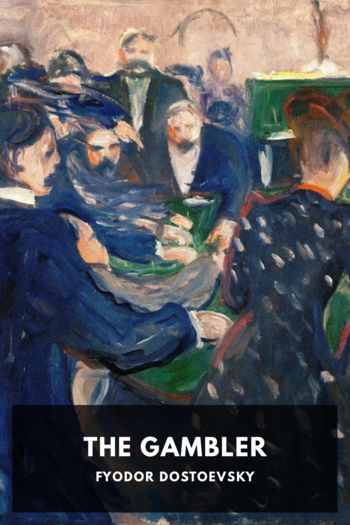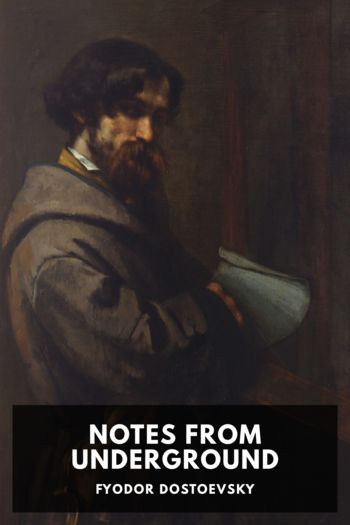The Gambler by Fyodor Dostoevsky (best motivational books for students .txt) 📕

- Author: Fyodor Dostoevsky
Book online «The Gambler by Fyodor Dostoevsky (best motivational books for students .txt) 📕». Author Fyodor Dostoevsky
“What? While he is engaged with a Cardinal?” screeched the sacristan, again shrinking back in horror. Then, rushing to the door, he spread out his arms as though he would rather die than let me enter.
Thereupon I declared that I was a heretic and a barbarian—“Je suis hérétique et barbare,” I said, “and that these archbishops and cardinals and monsignors, and the rest of them, meant nothing at all to me. In a word, I showed him that I was not going to give way. He looked at me with an air of infinite resentment. Then he snatched up my passport, and departed with it upstairs. A minute later the passport had been visaed! Here it is now, if you care to see it,”—and I pulled out the document, and exhibited the Roman visa.
“But—” the General began.
“What really saved you was the fact that you proclaimed yourself a heretic and a barbarian,” remarked the Frenchman with a smile. “Cela n’était pas si bête.”
“But is that how Russian subjects ought to be treated? Why, when they settle here they dare not utter even a word—they are ready even to deny the fact that they are Russians! At all events, at my hotel in Paris I received far more attention from the company after I had told them about the fracas with the sacristan. A fat Polish nobleman, who had been the most offensive of all who were present at the table d’hôte, at once went upstairs, while some of the Frenchmen were simply disgusted when I told them that two years ago I had encountered a man at whom, in 1812, a French ‘hero’ fired for the mere fun of discharging his musket. That man was then a boy of ten and his family are still residing in Moscow.”
“Impossible!” the Frenchman spluttered. “No French soldier would fire at a child!”
“Nevertheless the incident was as I say,” I replied. “A very respected ex-captain told me the story, and I myself could see the scar left on his cheek.”
The Frenchman then began chattering volubly, and the General supported him; but I recommended the former to read, for example, extracts from the memoirs of General Perovski, who, in 1812, was a prisoner in the hands of the French. Finally Maria Philipovna said something to interrupt the conversation. The General was furious with me for having started the altercation with the Frenchman. On the other hand, Mr. Astley seemed to take great pleasure in my brush with Monsieur, and, rising from the table, proposed that we should go and have a drink together. The same afternoon, at four o’clock, I went to have my customary talk with Polina Alexandrovna; and, the talk soon extended to a stroll. We entered the Park, and approached the Casino, where Polina seated herself upon a bench near the fountain, and sent Nadia away to a little distance to play with some other children. Mischa also I dispatched to play by the fountain, and in this fashion we—that is to say, Polina and myself—contrived to find ourselves alone.
Of course, we began by talking on business matters. Polina seemed furious when I handed her only 700 gülden, for she had thought to receive from Paris, as the proceeds of the pledging of her diamonds, at least 2,000 gülden, or even more.
“Come what may, I must have money,” she said. “And get it somehow I will—otherwise I shall be ruined.”
I asked her what had happened during my absence.
“Nothing; except that two pieces of news have reached us from St. Petersburg. In the first place, my grandmother is very ill, and unlikely to last another couple of days. We had this from Timothy Petrovitch himself, and he is a reliable person. Every moment we are expecting to receive news of the end.”
“All of you are on the tiptoe of expectation?” I queried.
“Of course—all of us, and every minute of the day. For a year-and-a-half now we have been looking for this.”
“Looking for it?”
“Yes, looking for it. I am not her blood relation, you know—I am merely the General’s stepdaughter. Yet I am certain that the old lady has remembered me in her will.”
“Yes, I believe that you will come in for a good deal,” I said with some assurance.
“Yes, for she is fond of me. But how come you to think so?”
I answered this question with another one. “That Marquis of yours,” I said, “—is he also familiar with your family secrets?”
“And why are you yourself so interested in them?” was her retort as she eyed me with dry grimness.
“Never mind. If I am not mistaken, the General has succeeded in borrowing money of the Marquis.”
“It may be so.”
“Is it likely that the Marquis would have lent the money if he had not known something or other about your grandmother? Did you notice, too, that three times during luncheon, when speaking of her, he called her ‘La Baboulenka’?1 What loving, friendly behaviour, to be sure!”
“Yes, that is true. As soon as ever he learnt that I was likely to inherit something from her he began to pay me his addresses. I thought you ought to know that.”
“Then he has only just begun his courting? Why, I thought he had been doing so a long while!”
“You know he has not,” retorted Polina angrily. “But where on earth did you pick up this Englishman?” She said this after a pause.
“I knew you would ask about him!” Whereupon I told her of my previous encounters with Astley while travelling.
“He is very shy,” I said, “and susceptible. Also, he is in love with you.”
“Yes, he is in love with me,” she replied.
“And he is ten





Comments (0)